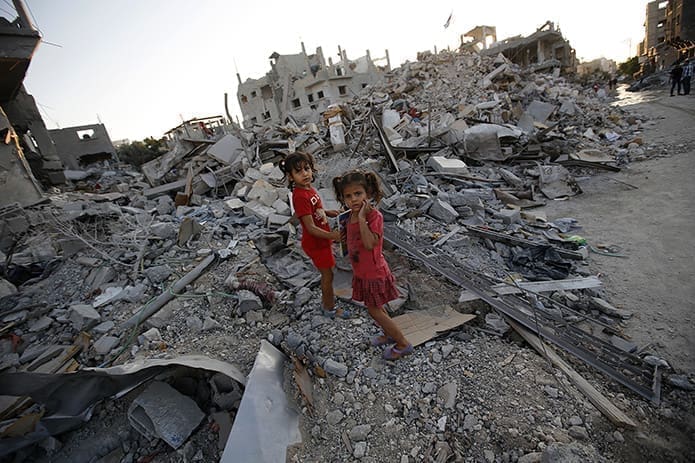 CNS photo/Mohammed Saber, EPA
CNS photo/Mohammed Saber, EPA Amman
Gazans, aid workers wait to see if truce will be renewed
By DALE GAVLAK, Catholic News Service | Published August 21, 2014
AMMAN, Jordan (CNS)—Humanitarians and the people of the Gaza Strip are apprehensive about whether there will be a renewal of the truce between Israel and the militant Hamas, said a U.S. Catholic aid official.
“There’s a lot of hope that the airstrikes and rockets will not start again after Tuesday midnight because of such a traumatic, terrible month,” said Matthew McGarry, who directs the Catholic Relief Services’ operations in Gaza, the West Bank and Jerusalem.
“At the same time, people make the point that life in Gaza before this latest escalation was already on the verge of a full-scale humanitarian crisis,” McGarry told Catholic News Service in a phone interview from Jerusalem in mid-August.
“But just stopping the act of violence is not sufficient to resolving the challenges posed by the current status of Gaza,” he emphasized.
McGarry, who visited Gaza twice during the conflict, said that while the fighting is on hold, the humanitarian situation remained “extreme … dire,” and that could continue for some time.
Hundreds of thousands of people have been displaced from their homes. There are still widespread shortages of water, and to a lesser extent food, the Catholic aid official said. The electricity in Gaza is still unreliable, with no more than six hours of electricity per day.
“It’s rare to find somebody in Gaza, with a third of the population displaced at its peak, who wasn’t either displaced themselves or hosting displaced family members or who had a friend or relative killed in the fighting,” McGarry said.
He described the degree of destruction of Gaza’s physical environment as “very surreal.”
“Every second or third block in Gaza City, there is a house or level of an apartment building or shop that is completely annihilated, having been hit by a rocket strike. It is completely gone,” he said.
“But then as you move out to areas outside the city, entire neighborhoods are pulverized. The level of trauma is extremely high given the level of displacement and damage to residential neighborhoods,” McGarry said of Shijaiyah, less than a mile from the Israeli border, and Beit Hanoun in the buffer zone.
“There are still families there but, unfortunately, most houses are leveled to the ground or are uninhabitable,” he said.
The aid official said he helped with distributing assistance at various points in Gaza and the people who lined up to receive the basics had “homes destroyed and were displaced in (the) middle of the night.”
“It was extremely traumatic and quite widespread,” he said.
McGarry recalled meeting a Gazan man who was standing for nearly an hour in the heat to receive a basic set of kitchen utensils and cooking coil, hygiene kits and a water tank.
He said that while the man greatly appreciated the aid, he noted the irony of his circumstances.
“Three weeks ago, I had a $6,000 kitchen which was put into my home. I worked with my family and my brothers to build this house,” the man told McGarry. “In an instant, in a puff of smoke, it was all gone.”
More than 2,000 Gazans, mostly civilians, have been killed in the densely populated coastal territory, according to the Palestinian Health Ministry. Sixty-four Israeli soldiers and three civilians in Israel died in the violence. The United Nations reports 425,000 people in Gaza have been displaced in the summer conflict.
McGarry said CRS aid workers in Gaza also were directly impacted by the fighting.
“We have several staff members with extended family who died in the airstrikes. Half of the staff were displaced from their homes because houses were damaged or had incoming airstrikes around them and wanted to flee to safety,” he said. “The other half of the staff took in family members who were displaced from their homes.”
Despite the enormous challenges, he said CRS has been doing “our best to take advantage of the quiet” during the truce by distributing nonfood items, including hygiene kits, kitchen sets and water storage equipment to more than 15,000 people.
The agency is providing psychosocial support and fuel and has delivered medical supplies to the Anglican Al-Ahli Arab Hospital, the only Christian hospital in Gaza, and to clinics run by Caritas and the Middle East Council of Churches.
“We are now preparing for another round of distribution, including family survival kits with additional food and water, as well as starting rehabilitation and recovery work,” the CRS official added.
He said it was time for both sides to begin to tackle Gaza’s deep-seated issues.
“Gaza has been a difficult place for a long time and has got progressively worse. The living situation and the quality of life have been steadily deteriorating for some time,” McGarry said.
“Humanitarians have to be relatively hopeful with a good deal of skepticism,” he said of Gaza’s future.